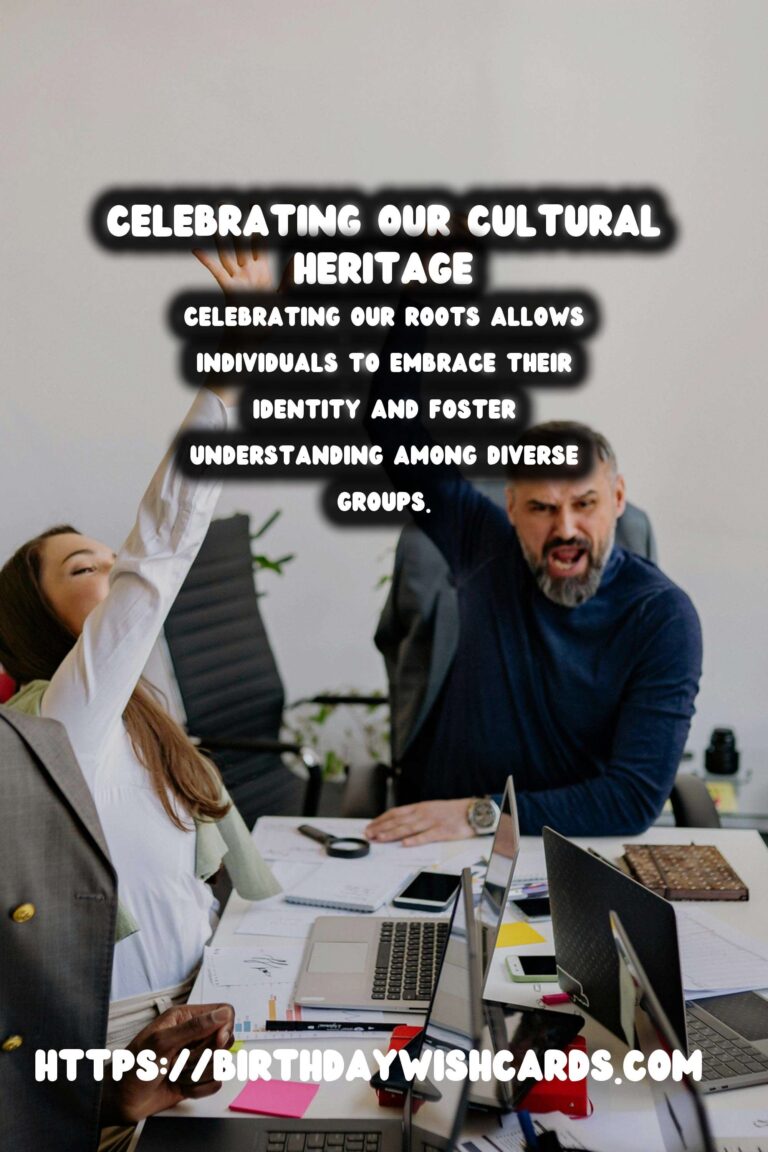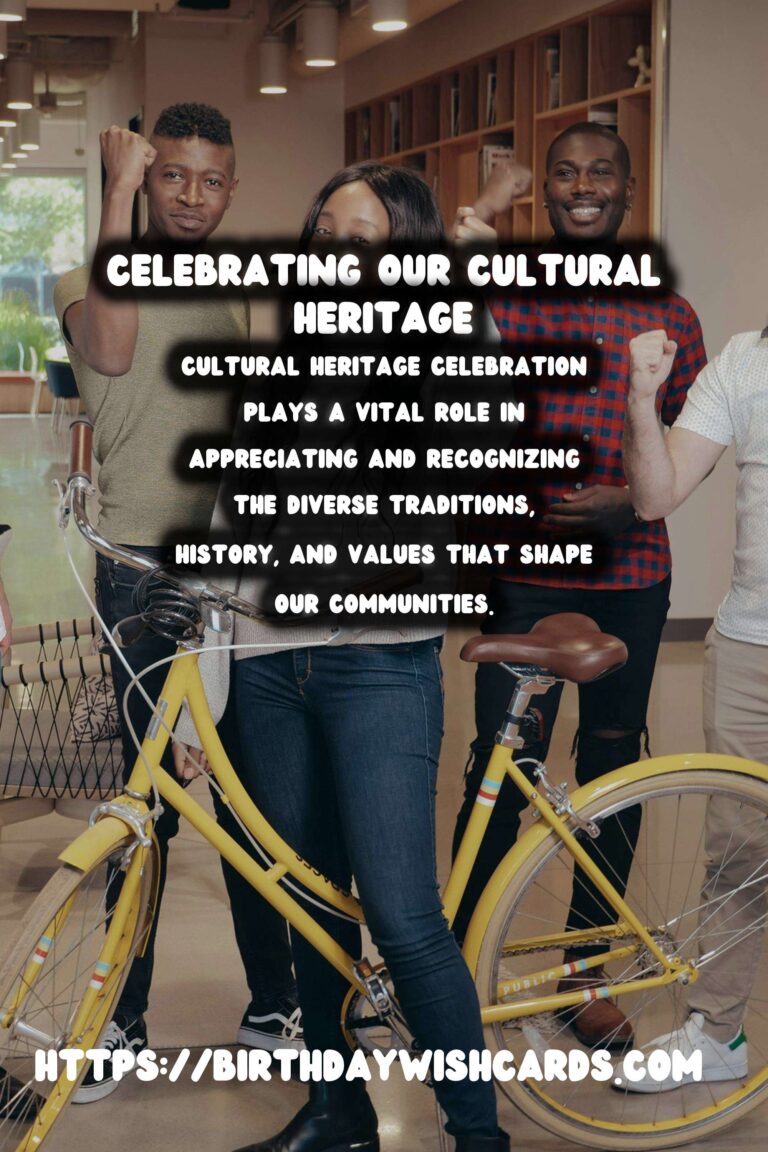
Cultural heritage celebration plays a vital role in appreciating and recognizing the diverse traditions, history, and values that shape our communities. Whether through festivals, food, art, or various forms of expressions, celebrating our roots allows individuals to embrace their identity and foster understanding among diverse groups. In this article, we’ll explore some inspirational ways to celebrate cultural heritage and provide practical tips to organize memorable heritage celebrations.
The Importance of Cultural Heritage
Cultural heritage reflects the historical and social contexts that define our identities. It encompasses traditions passed down through generations, encompassing language, art, music, and cuisine. By honoring these customs, we not only preserve our unique identities but also enrich our communities and promote social cohesion.
1. Organize a Cultural Festival
One of the most popular ways to celebrate cultural heritage is by organizing a cultural festival. Festivals bring people together in joyful celebration, showcasing traditions through various activities. Here are some tips to create a successful cultural festival:
- Engage the Community: Involve local artists, historians, and community leaders to ensure authentic representation of your culture.
- Activities and Workshops: Offer hands-on workshops that teach traditional crafts, cuisine, or dance.
- Host Cultural Performances: Include performances by local musicians, dancers, and cultural groups to entertain the audience.
2. Culinary Heritage Events
Food is one of the most relatable aspects of culture. Organizing culinary events focused on traditional dishes can be a delicious way to celebrate heritage. Here are some creative ideas:
- Cooking Classes: Offer group classes where participants can learn how to cook traditional meals.
- Food Tasting Events: Create a tasting menu featuring dishes from various cultural backgrounds, allowing attendees to explore and appreciate diverse flavors.
- Potluck Gatherings: Encourage community members to bring traditional dishes to share, promoting exchange and storytelling around food.
3. Educational Workshops and Seminars
Education is a powerful tool for understanding and appreciating cultural heritage. Consider organizing workshops and seminars that explore topics related to your heritage:
- History and Storytelling: Invite speakers or historians to discuss the cultural significance and history of traditions and customs.
- Language Classes: Offer introductory classes for the community to learn words or phrases in the traditional language.
- Arts and Crafts Sessions: Provide materials and guidance for traditional arts and crafts, helping participants to create something meaningful.
4. Cultural Exhibitions
Exhibitions highlighting cultural history, artifacts, and art can make a significant impact. Here’s how to curate an effective exhibition:
- Collaboration with Local Museums: Partner with local museums to display artifacts and artwork that showcase your cultural heritage.
- Interactive Displays: Include multimedia presentations, hands-on activities, and displays that engage visitors.
- Community Contributions: Encourage community members to lend their personal stories and items for display.
5. Virtual Heritage Celebrations
In today’s digital age, virtual celebrations can reach wider audiences and transcend geographical boundaries. Here are some ideas for virtual celebrations:
- Online Workshops: Host webinars or live streaming events showcasing various cultural activities.
- Social Media Campaigns: Use hashtags to promote cultural significance and invite people to share their stories and experiences online.
- Virtual Tours: Create online tours that allow participants to explore cultural sites or view performances remotely.
6. Create a Cultural Heritage Website
Having an online platform dedicated to cultural heritage can be a great resource. It can include:
- History and Resources: Provide articles, links, and resources about cultural heritage.
- Event Calendar: Maintain a calendar of cultural events and celebrations.
- Community Forum: Create a space for community members to share their experiences and connect with each other.
7. Sustainable Practices in Heritage Celebrations
As we celebrate our culture, it’s essential to consider environmentally sustainable practices. Tips for sustainable heritage celebrations include:
- Environmentally Friendly Materials: Use recyclable or biodegradable materials for decorations and utensils.
- Promote Local Vendors: Supporting local businesses reduces carbon footprints and enhances community ties.
- Educational Initiatives: Incorporate sessions about sustainability and environmental practices within your culture.
8. Involve Youth in Cultural Heritage
Engaging youth is vital for the continuity of cultural heritage. Here are ways to involve younger generations:
- Cultural Mentorship Programs: Connect younger community members with elders to learn about traditions and customs.
- School Collaborations: Partner with schools to organize cultural days where students can showcase their heritage.
- Cultural Competitions: Organize contests (art, essays, speeches) that encourage youth to explore and present their cultural heritage.
9. Documentation and Archiving
To preserve cultural heritage for future generations, accurate documentation is key:
- Oral Histories: Conduct interviews with elder community members to capture their stories and experiences.
- Photography Projects: Document cultural events and practices through photography to create a visual history.
- Publishing Collections: Compile essays, stories, or recipes into a community book that can be shared and celebrated.
10. Collaboration with Other Cultures
Cultural exchange can foster greater understanding and appreciation among diverse groups. Collaboration ideas include:
- Joint Events: Organize events that showcase the best of multiple cultures together, emphasizing shared values and traditions.
- Inclusive Workshops: Offer workshops that merge different art forms or culinary practices, promoting inclusivity.
- Cultural Dialogues: Host discussions where representatives from different cultures can share experiences and build relationships.
Conclusion
Celebrating cultural heritage is not only a way to honor the past but also to inspire future generations. Through creative ideas and community involvement, we can ensure that diverse traditions are celebrated, preserved, and cherished. Whether it’s through festivals, culinary events, educational workshops, or virtual celebrations, the possibilities are endless. Let’s come together to celebrate our cultural heritage and the rich tapestry of experiences it offers!
Cultural heritage celebration plays a vital role in appreciating and recognizing the diverse traditions, history, and values that shape our communities. Celebrating our roots allows individuals to embrace their identity and foster understanding among diverse groups.

